Cardi B and Offset share three children together — Kulture, 6, Wave, 3 and Blossom, born in 2024.
There’s nothing more inspiring than the natural world we live in.
Perhaps that’s what makes nature names for boys so popular today. After all, there’s no better way to honor our planet than by weaving its essence into the very identity of its next generation.
And if that means naming your son River, Forrest or Onyx — then who’s going to stop you?!
RELATED: These banned baby names and wild baby-naming laws will leave you speechless!
If you like to follow trends, you could go with the Latin name Oliver, meaning “olive tree planter,” which has been a top-five name in the U.S. every year since 2018, per the Social Security Administration (SSA).
Of course, Oliver only scratches the surface of what nature boy names have to offer.
Hudson, which means “son of Hugh” but can also refer to the Hudson River, and Leo, which translates to “lion” in Latin, are two other nature names for boys that landed in the Social Security’s top-25 of 2024.
Dylan (“son of the sea”), Mason (“stoneworker”) and Logan (“little hollow”) each landed in the top-50.
Plus, there are so many different ways to go about nature inspired boy names.
You can go with a botanical boy name like Birch or Cedar, a water-inspired name like Kai or Saylor, a gemstone name like Garnet or Jasper, or a sky-inspired name like Skyler or Orion.
If those are the types of names that tickle your fancy, then you’ll love these nature names for boys!
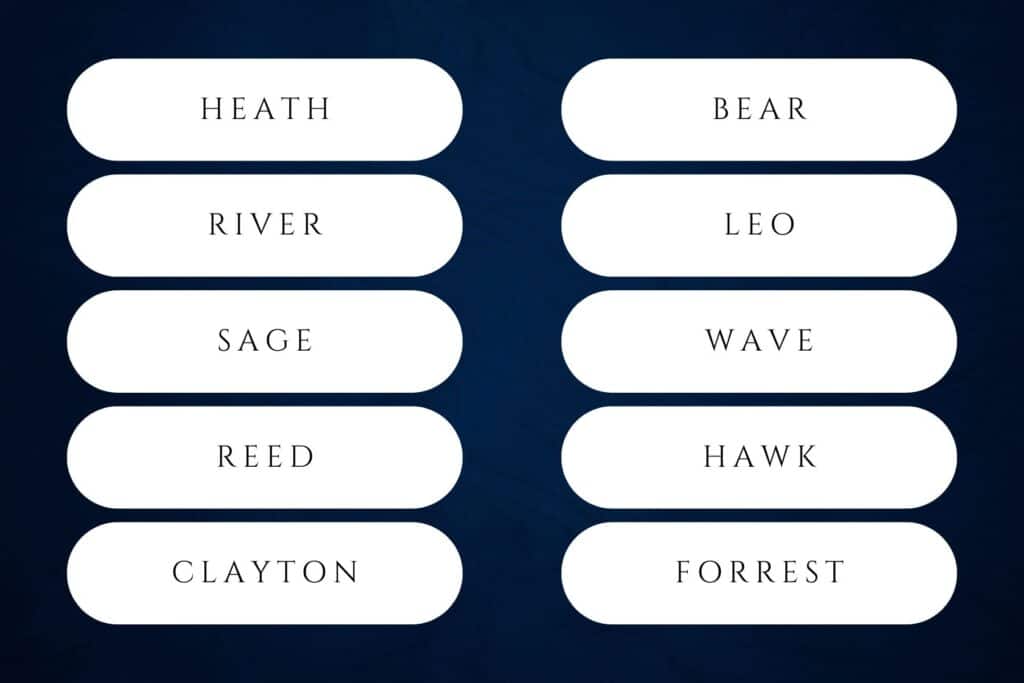
Heath
Origin: English
Meaning: Uncultivated land; Wasteland
Heath, pronounced HEETH, originated as an English surname given to someone who lived on or near a heath, which refers to “a tract of open and uncultivated land” or a “wasteland overgrown with shrubs.”
River
Origin: English; Old French; Latin
Meaning: Natural stream of freshwater
River, pronounced RIH-ver, comes directly from the English word, which is derived from the Old French word riviere and Latin word ripa, referring to a riverbank or natural stream of freshwater that flows from a source.
Sage
Origin: English; Latin
Meaning: Grey-green; Aromatic herb; Wise
Sage, pronounced SAYJ, has several origins as a word for wisdom, an aromatic herb (known as Salvia officinalis) used in cooking or a muted, earthy greyish-green, similar to the color of dried sage leaves.
Reed
Origin: Old English
Meaning: Red; Tall grass-like plant
Reed, pronounced REED, derives from the Old English word read, meaning “red,” and originated as a surname for someone with red hair or a ruddy complexion. It also refers to tall grass-like plants that grow in marshes.
Clayton
Origin: Old English
Meaning: Clay town
Clayton, pronounced KLAY-tun or KLAY-tin, originated as a surname derived from various place names, all of which are composed of the Old English elements clæg, meaning “clay,” and tun, meaning “town.”
Bear
Origin: English
Meaning: Bear (animal)
Bear, pronounced BAIR, comes directly from the English word for the animal, traditionally viewed as a symbol of strength, courage, and protection. The word bear is derived from the Old English word bera.
Leo
Origin: Latin; Greek
Meaning: Lion; Zodiac sign; Constellation
Leo, pronounced LEE-oh, comes directly from the Latin word leo, meaning “lion,” ultimately a cognate of the Greek name Leon of the same meaning. Leo is also a constellation and the fifth sign of the zodiac.
Wave
Origin: English
Meaning: Move back and forth; Disturbance
Wave, pronounced WAYV, comes directly from the English word wave (derived from the Old English word wafian), either meaning “to move back and forth or up and down” or referring to the water phenomena.
Hawk
Origin: English; Germanic
Meaning: Predatory bird
Hawk, pronounced HAWK, comes directly from the English word hawk, which derives from the Germanic word habicht, referring to the predatory bird. Hawks generally symbolize vision, freedom and power.
Forrest
Origin: English; Old French
Meaning: Large area covered with trees
Forrest, pronounced FOHR-ist, comes from the English word forest and Old French word forest, referring to a large area covered with trees. It was traditionally given to someone who lived or worked in a forest.
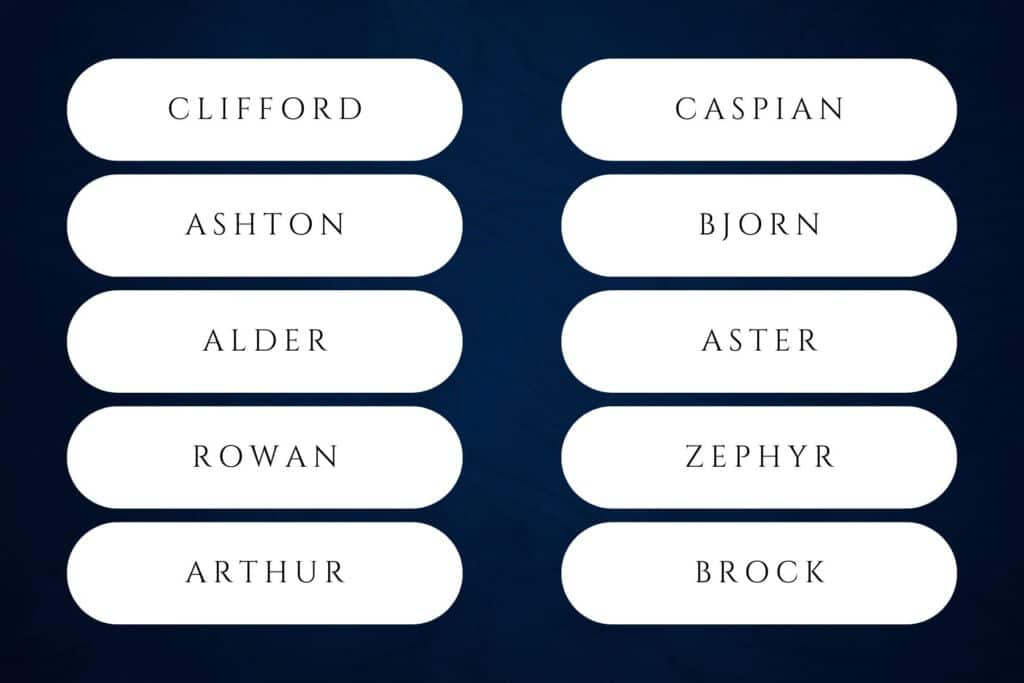
Clifford
Origin: Old English
Meaning: Ford by a cliff
Clifford, pronounced KLIF-erd, originated as an English place name meaning “ford by a cliff,” and is composed of the Old English elements clif, meaning “cliff,” and ford, meaning “shallow place in water.”
Ashton
Origin: Old English
Meaning: Town of ash trees; Ash tree settlement
Ashton, pronounced ASH-tun, is a combination of the Old English words æsc, meaning “ash tree,” and tun, meaning “town” or “settlement.” It was popularized by Ashton Main from the 1985 miniseries “North and South.”
Alder
Origin: Old English
Meaning: Alder tree
Alder, pronounced AWL-der, comes from the Old English word alor, referring to the alder tree — a deciduous tree often found near water and known for its rot-resistant wood and erosion prevention.
Rowan
Origin: Gaelic
Meaning: Rowan tree; Little red one
Rowan, pronounced ROH-win, comes from the Gaelic word ruadh, meaning "red," and refers to the rowan tree (mountain ash), known for its bright red berries. In Celtic mythology, the rowan was considered a protective tree.
Arthur
Origin: Old Welsh
Meaning: Bear-like, Bear man
Arthur, pronounced AHR-thur, is believed to derive from the Old Welsh elements arth, meaning “bear,” and gur, meaning “man.” It was widely popularized by King Arthur, a legendary king of Britain.
Caspian
Origin: Persian
Meaning: Body of water; Caspian Sea; Ancient people
Caspian, KASP-ee-uhn or KAS-pee-in, comes from the name of the Caspian Sea, the world's largest inland body of water, which was likely named after the ancient people who once lived in Transcaucasia.
Bjorn
Origin: Old Norse
Meaning: Bear
Bjorn, pronounced BYORN, comes directly from the Old Norse word bjǫrn, meaning “bear” — an animal revered for its strength and courage in Norse culture. It’s a popular name in Scandinavian countries.
Aster
Origin: Greek
Meaning: Star; Aster flower
Aster, pronounced ASS-ter, derives from the Greek word aster, meaning "star." It also refers to the aster flower, which is known for its star-like shape and often symbolizes patience, faith, love, valor and wisdom.
Zephyr
Origin: Greek
Meaning: West wind
Zephyr, pronounced ZEH-fir, comes from the Greek word zephyros, meaning "west wind." In Greek mythology, Zephyros was the god of the west wind, often associated with gentle breezes and the arrival of spring.
Brock
Origin: Old English
Meaning: Badger
Brock, pronounced BROK, comes from the Old English word brocc, meaning “badger.” It originated as a surname and combines natural imagery with a concise, strong sound and straightforward spelling.
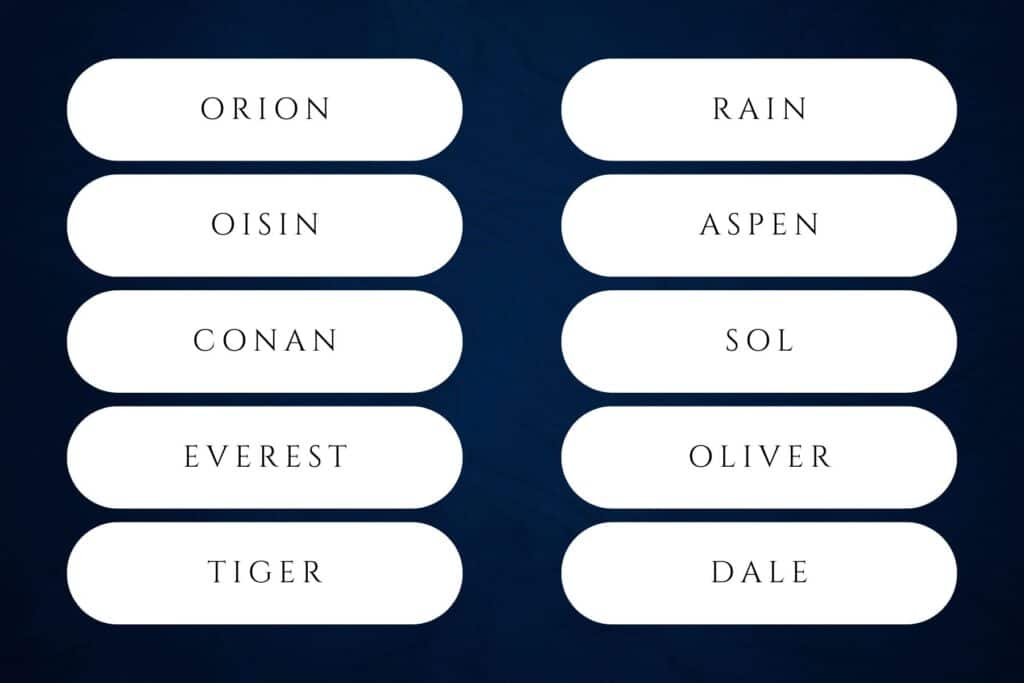
Orion
Origin: Greek
Meaning: Mighty hunter; Constellation; Boundary
Orion, pronounced oh-RYE-uhn, comes from Greek mythology, where Orion was a mighty hunter. The name also refers to the constellation Orion and is sometimes linked to the Greek word horion, meaning “boundary” or “limit.”
Oisin
Origin: Irish
Meaning: Little deer
Oisin, pronounced OH-sheen, derives from the Irish word os, meaning "deer." In Irish mythology, Oisín was the greatest poet in Ireland and the son of the warrior Fionn mac Cumhaill and the goddess Sadhbh.
Conan
Origin: Irish
Meaning: Little wolf; Little hound
Conan, pronounced COH-nen, derives from the Irish word cú, meaning “wolf” or “hound,” combined with a diminutive suffix. It was popularized by Arthur Conan Doyle, Conan the Barbarian and Conan O’Brien.
Everest
Origin: English
Meaning: From Évreux; World’s highest mountain
Everest, pronounced EH-ver-ist, originated as a surname given to someone from Évreux in Normandy, but is more commonly associated with Mount Everest, the world’s highest mountain located in Asia.
Tiger
Origin: English
Meaning: Large cat
Tiger, pronounced TYE-ger, comes directly from the English word tiger (derived from Middle English tigre and Old English tigras), referring to the large cat adorned with beautiful orange and black stripes.
Rain
Origin: English
Meaning: Water from the atmosphere
Rain, pronounced RAYN, comes directly from the English word rain (derived from Middle English rein and Old English regn), referring to the “water falling in drops condensed from vapor in the atmosphere.”
Aspen
Origin: Old English
Meaning: Aspen tree; City in Colorado
Aspen, pronounced ASS-pin, comes from the Old English word æspe, referring to the aspen tree known for its white bark and yellow foliage. It also refers to the city of Aspen in Colorado, known as a ski resort.
Sol
Origin: Spanish; Portuguese; Hebrew
Meaning: Sun; Peace
Sol, pronounced SUHL, comes directly from the Spanish and Portuguese word for “sun.” It can also be a diminutive or nickname for Solomon, which derives from the Hebrew word shalom, meaning “peace.”
Oliver
Origin: Latin
Meaning: Olive tree planter
Oliver, pronounced AH-lih-ver, comes from the Latin word olivarius, meaning “olive tree planter,” which is ultimately derived from the Latin word oliva, meaning “olive tree.” The name Olive is also popular today.
Dale
Origin: Old English
Meaning: Valley
Dale, pronounced DAYL, comes directly from the English word dale (Old English dæl), meaning “valley” or referring to a “level or gently sloping ground between low hills with a stream flowing through it.”

Cedar
Origin: Latin; Greek
Meaning: Cedar tree
Cedar, pronounced SEE-der, comes from the Latin word cedrus and Greek word kedros, referring to the cedar tree — an aromatic evergreen conifer known for its durable, fragrant wood often used as timber.
Stone
Origin: English
Meaning: Discrete piece of rock
Stone, pronounced STOHN, comes directly from the English word stone, which derives from the Old English word stan, referring to a “discrete piece of rock.” It originated as a surname, but is now also used as a given name.
Glen
Origin: Gaelic; English
Meaning: Valley
Glen, pronounced GLEN, derives from the Gaelic word gleann and Old Norse word glyn, meaning “valley.” In English, a “glen” is a narrow valley deep in the mountains that’s either lush and green or forms into a stream.
Kai
Origin: Hawaiian; Chinese
Meaning: Sea; Triumph; Victory
Kai, pronounced KYE, comes directly from the Hawaiian word kai, meaning “sea.” It can also be derived from the Chinese word kǎi, meaning “triumph” and “victory.” It’s also a popular name for baby girls.
Rio
Origin: Spanish
Meaning: River
Rio, pronounced REE-oh, comes directly from the Spanish word rio, meaning “river.” The name gained international recognition through the Brazilian city of Rio de Janeiro, which means “River of January.”
Callum
Origin: Scottish Gaelic; Latin
Meaning: Dove
Callum, pronounced KAHL-uhm, is the Scottish Gaelic form of the Latin name Columba, which comes from the Latin word columba, meaning “dove.” It was popularized by Irish missionary Saint Columba.
Logan
Origin: English; Gaelic
Meaning: Little hollow; Little pit
Logan, pronounced LOH-gyn or LOH-gan, originated as a place name Ayrshire, which was ultimately derived from the Gaelic element lag, meaning “hollow” or “pit,” combined with a diminutive suffix.
Linden
Origin: German; Dutch
Meaning: Linden tree
Linden, pronounced LIN-dun or LIN-din, comes from a German and Dutch surname that was derived from the Old High German word linta, meaning "linden tree.” Other similar names include Lyndon and Landon.
Silas
Origin: Latin; Roman
Meaning: Woods; Forest
Silas, pronounced SYE-lis or SYE-lus, is believed to be a diminutive of Silvanus, which derives from the Latin word silva, meaning “wood” or “forest.” In Roman mythology, Silvanus was the god of forests.
Corbin
Origin: Old French
Meaning: Raven; Dark-haired
Corbin, pronounced KOHR-bin, derives from the Old French word corbeau, meaning “raven.” It was originally given to someone with dark hair, resembling the dark black feathers of a raven (bird).
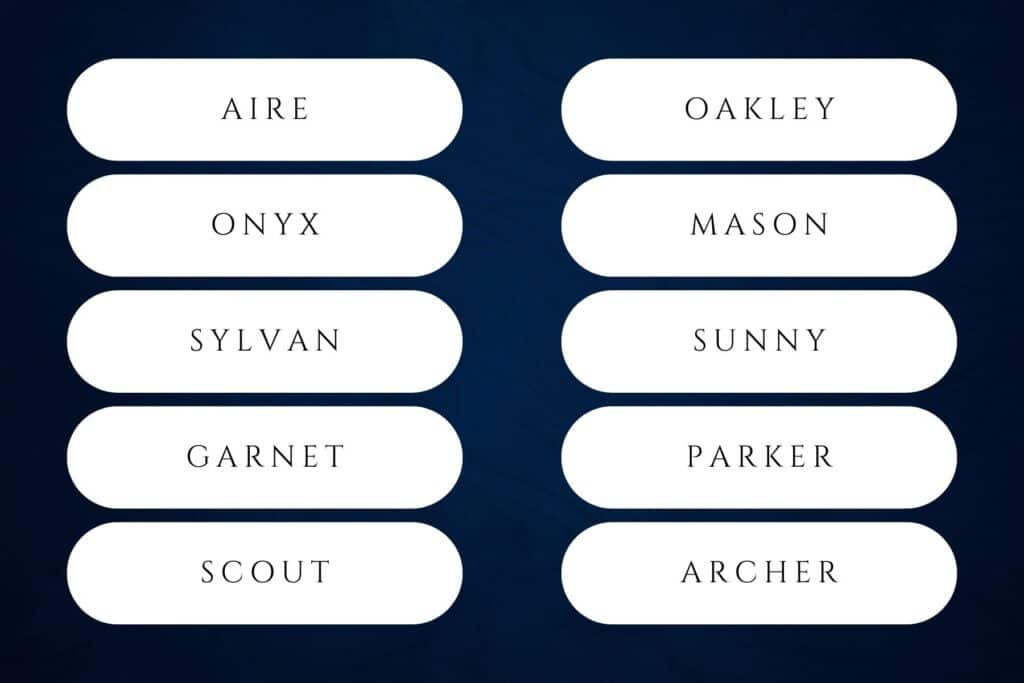
Aire
Origin: English; Latin; Greek
Meaning: Air; Atmosphere
Aire, pronounced AYR, is a modern way of spelling the English word air, referring to the atmosphere and the invisible gases that surround the earth. The word air comes from the Latin aer and Greek aēr.
Onyx
Origin: Greek; English
Meaning: Claw; Talon; Black gemstone
Onyx, pronounced AH-niks, derives from the Greek word onyx, meaning “claw” or “talon.” In English, the word onyx refers to a gemstone, a banded variety of chalcedony, known for its black and white color.
Sylvan
Origin: Latin; Roman
Meaning: Woods; Forrest
Sylvan, pronounced SIL-vin, is believed to be a diminutive of Silvanus, which derives from the Latin word silva, meaning “wood” or “forest.” Silvanus was the Roman god of forests and a companion to Saint Paul in the Bible.
Garnet
Origin: English; Old French; Latin
Meaning: Dark red color; Gemstone; January birthstone
Garnet, pronounced GAHR-net or GAHR-nit, comes directly from the English word garnet (derived from Old French grenate and Medieval Latin granatum), referring to the dark red color or precious gemstone.
Scout
Origin: English; Old French
Meaning: Explorer; Observer; Listener
Scout, pronounced SKOWT, comes directly from the English word scout (derived from the Old French word escouter, meaning “to listen”), referring to someone who explores, observes or gathers information.
Oakley
Origin: English
Meaning: Oak tree meadow; Oak tree clearing
Oakley, pronounced OHK-lee, comes from the Middle English words oke, referring to the oak tree, and legh, meaning “clearing” or “meadow.” Therefore, Oakley refers to a meadow of oak trees or a clearing among the oak trees.
Mason
Origin: English; Old French
Meaning: Stoneworker
Mason, pronounced MAY-sin, originated as an English occupational surname given to someone who worked with stone. It ultimately derives from the Old French word maçon, meaning “stone mason.”
Sunny
Origin: English
Meaning: Full of sun; Very bright; Cheerful
Sunny, pronounced SUN-nee, comes directly from the English word sunny, meaning “full of sun” or “very bright.” In some contexts, the word sunny can mean “cheerful” or “happy,” as in someone’s personality.
Parker
Origin: English
Meaning: Park worker; Park manager
Parker, pronounced PAHR-ker, derives from the Old English word parc, meaning "park" or "enclosed land." It was originally an occupational surname for someone who worked in or managed a park.
Archer
Origin: English; Old French
Meaning: Bowman; Archer
Archer, pronounced AHR-cher, derives from the Old French word archier, meaning "bowman" or "archer.” It originated as a surname given to someone who worked as an archer, typically in medieval warfare.

Hunter
Origin: English
Meaning: Hunter; Pursuer
Hunter, pronounced HUN-ter, derives from the Old English word hunta, meaning "hunter" or "pursuer." It originated as an occupational surname for those who hunted, either to gather food, material or for fun.
Leonardo
Origin: Spanish; Italian; Germanic
Meaning: Brave lion; Brave like a lion
Leonardo, pronounced lee-oh-NAHR-doh, is the Italian, Spanish and Portuguese version of Leonard, which ultimately derives from the Germanic elements lewo, meaning “lion,” and hart, meaning “brave.”
Jasper
Origin: Latin; Hebrew; Persian
Meaning: Treasurer; Precious stone
Jasper, pronounced JAS-per, originated from the Latin name Gaspar and Hebrew word gizbar (from Persian word ganzabarah), meaning “treasurer.” It’s also the name of a precious stone used for jewelry.
Slate
Origin: English; Old French
Meaning: Fine-grained rock; Tile
Slate, pronounced SLAYT, comes directly from the English word slate (derived from the Old English sclate and Old French esclate), referring to the fine-grained, foliated, homogeneous, metamorphic rock.
Rocky
Origin: English; Germanic
Meaning: Full of rocks; Rook; Crow
Rocky, pronounced RAH-kee, comes from the English word rock, referring to a collection of minerals, but can also be a diminutive of the name Rocco, which comes from the Germanic element hruoh, meaning “rook” or “crow.”
Sequoia
Origin: Native American (Cherokee)
Meaning: Sequoia tree; Giant tree
Sequoia, pronounced sih-KWOY-ah, is named after the giant sequoia tree native to California, itself named in honor of Sequoyah, the Cherokee silversmith who created the Cherokee syllabary.
Cove
Origin: English
Meaning: Coastal inlet; Den; Cave; Nook
Cove, pronounced KOHV, comes directly from the English word cove (derived from the Old English word cofa), referring to a small coastal inlet with narrow, restricted entrances or a den, cave, or hollow nook.
Peter
Origin: Greek
Meaning: Stone; Rock
Peter, pronounced PEE-ter, comes from the Greek name Petros and Greek word petros, meaning “stone.” In the Bible, Peter was a fisherman and one of Jesus' twelve apostles, initially known as Simon Peter.
Grover
Origin: Old English
Meaning: Grove dweller; One who lives in or near a grove
Grover, pronounced GROH-ver, comes from Old English graf meaning "grove" and the suffix -er indicating a person, thus "one who lives in a grove" or "grove dweller." A grove is a group of trees or wooded area.
Dylan
Origin: Welsh
Meaning: Born of the sea; Son of the sea
Dylan, pronounced DIL-ihn, comes from Welsh mythology where Dylan was a sea god. The name ultimately derives from Welsh elements dy, meaning “to” or “toward,” and llanw, meaning “tide” or “flow.”
Yarrow
Origin: English
Meaning: Perennial herb; Achillea millefolium
Yarrow, pronounced YAHR-oh, comes directly from the English word yarrow (derived from Old English gearwe), referring to the plant (Achillea millefolium) known for its flat-topped or dome-shaped clusters of white flowers.
Hawthorn
Origin: Old English
Meaning: Thorn bush enclosure
Hawthorn, pronounced HAW-thorn, comes from the name of the hedging plant. The word derives from the Old English word hagaþorn, which is composed of the Old English elements haga, meaning “enclosure,” and þorn, meaning “thorn bush.”
Celebrities Love Nature Names for Boys, Too!
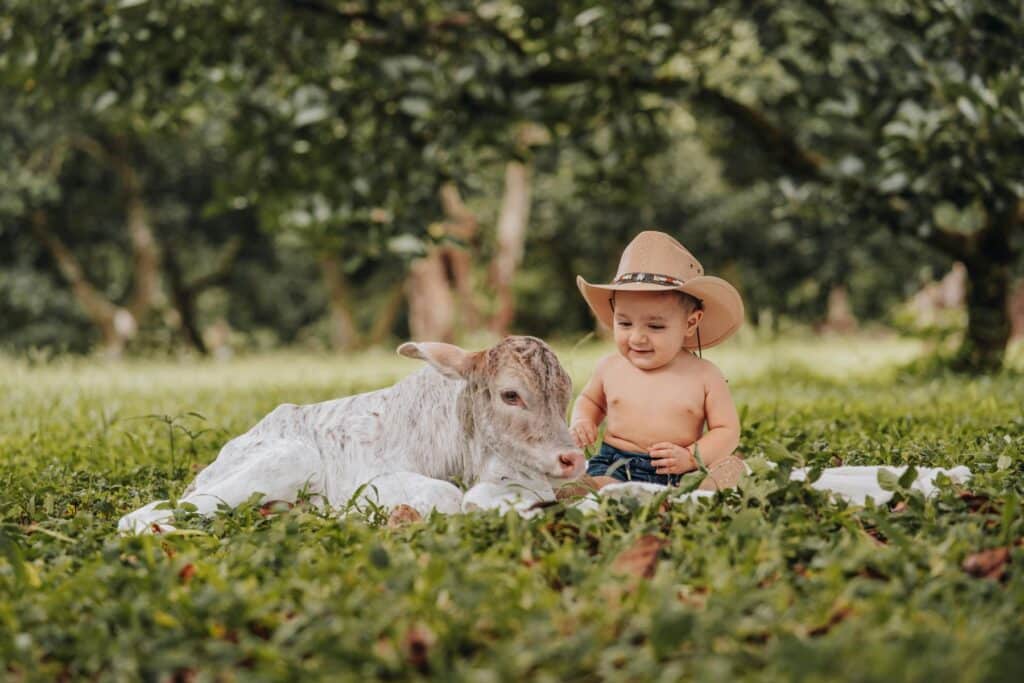
It’s no secret that celebrities and pop culture, in general, play big roles in setting baby name trends.
And nature names for boys are no different.
Just look at country music singer Maddie Marlow, who named her son Forrest, born in 2023, or British singer Jessie J, who named her son Sky, also born in 2023.
John Legend and Chrissy Teigen share a son named Wren, born in 2023, while rappers Cardi B and Offset share a son named Wave, born in 2021.
Let’s not forget about Kylie Jenner and rapper Travis Scott, who share a son named Aire, born in 2022, which is similar to the name WNBA legend Candace Parker chose for her son Airr, born in 2022.
And that’s just a small taste of the nature names for boys celebrities are choosing for their sons!
ALSO ON MOD MOMS CLUB: Extraordinarily Rare Baby Boy Names Parents Chose in 2024
Then again, nature baby names aren’t for everyone. If you didn’t find the baby name you were looking for, feel free to browse our other baby name content or use our baby name generator to make a custom list!












